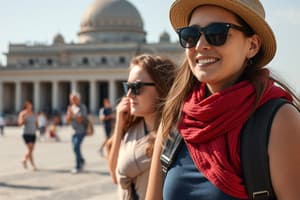Podcast
Questions and Answers
Match the types of impacts in tourism with their descriptions:
Match the types of impacts in tourism with their descriptions:
Direct Spending = Initial expenditure by tourists on goods and services Indirect Effects = Economic benefits that flow to other businesses Induced Effects = Impact from spending by employees of tourism-related businesses Employment Generation = Creation of new jobs due to tourism activity
Match the aspects of tourism multiplying effects with their economic impact:
Match the aspects of tourism multiplying effects with their economic impact:
Income = Economic gain from tourist spending Sales or Transaction = Increase in business revenues Output = Overall production levels influenced by tourism Government Revenue = Taxes and fees collected related to tourist activities
Match each impact of tourism with its potential benefit:
Match each impact of tourism with its potential benefit:
Infrastructure Development = Improved roads and public facilities Cultural Preservation = Support for local heritage and traditions Diversification of the Economy = Reduction of dependence on a single industry Tax Revenues = Increased funds for public services
Match each statement on tourism multiplying effects with its corresponding term:
Match each statement on tourism multiplying effects with its corresponding term:
Match the categories of tourism impacts with examples:
Match the categories of tourism impacts with examples:
Match the types of tourism spending with their definitions:
Match the types of tourism spending with their definitions:
Match the following terms related to tourism impact with their relevance:
Match the following terms related to tourism impact with their relevance:
Match the concepts of tourism impact with their characteristics:
Match the concepts of tourism impact with their characteristics:
Match the effects of tourism on the economy with their significance:
Match the effects of tourism on the economy with their significance:
Flashcards are hidden until you start studying
Study Notes
Tourist Typologies
- Plog's Typology (1977) identifies three tourist types: Psycho Centric (The Repeater), Mid-centric, and Allocentric (The Adventurer).
- Psycho Centric Tourists favor familiarity, visiting known destinations to relax and anticipate familiar food and activities; they prefer driving and family-type restaurants.
- Mid-Centric Tourists display a mix of characteristics of the Psycho Centric and Allocentric types, balancing familiarity and adventure.
Travel Behavior and Motivation
- Travel motivations vary by individual, often comprising a combination of factors.
- Understanding travel behavior includes recognizing the evolution of motivation and the decision-making process involved in travel.
Tourist Buying Decision Process
- The process consists of several stages:
- Pre-trip Preparation includes packing and obtaining necessary documents.
- Purchase Decision involves choosing a destination and services based on factors like price and value for money.
- Booking and Reservation includes securing accommodations and transportation.
- Travel Experience encompasses the entire journey and stay, impacting future travel decisions.
Negative Impacts of Tourism Industry (Economic Perspective)
- Rising Living Costs can displace local communities due to increased demand for housing and services.
- Infrastructure Strain occurs as local resources are stretched to accommodate growing tourist numbers, leading to maintenance costs for local governments.
- Environmental Degradation results from pollution and the overuse of resources, threatening biodiversity and ecosystems.
- Cultural Erosion risks authentic experiences as local customs may be altered for tourist appeasement.
- External Ownership in tourism can result in profit leakage, detracting economic benefits from local communities.
Positive Impacts of Tourism Industry (Economic Perspective)
- Tourism can lead to Short-term Economic Gains, but reliance on this approach may harm long-term sustainability.
- Regulation and Enforcement prompts local authorities to adopt stricter environmental policies to maintain destination appeal.
- Positive environmental experiences can inspire Environmental Stewardship, promoting conservation efforts among travelers.
Concepts of Tourism Multiplying Effects
- Refers to the broader economic, social, and cultural impacts of tourism that extend beyond initial tourist spending.
- Key Aspects of these effects include:
- Income generated locally through tourism activities.
- Employment opportunities arising from increased tourism-related operations.
- Sales/Transactions that stimulate local businesses.
- Government Revenue through taxes imposed on tourism activities.
- Output increases as various sectors benefit from tourism-related expenditure.
Tourism Multiplying Effects: Income Component
- Direct Spending by tourists serves as the initial economic contribution, impacting local businesses.
- Indirect Effects arise from subsequent spending as businesses purchase supplies and services.
- Induced Effects occur when employees spend their wages locally, further spurring economic activity.
- Infrastructure Development enhances the local economy, benefiting both tourists and residents.
- Diversification of the Economy encourages the development of new sectors to cater to tourism demands, promoting resilience.
Studying That Suits You
Use AI to generate personalized quizzes and flashcards to suit your learning preferences.


